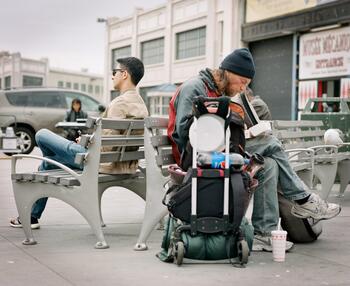
“I just took [my son] to our local Walgreens to buy him a toy. While there, a man shoved past me so firmly that he sent me into the shelving. Then he proceeded to fill a brown paper bag with Halloween candy and waltzed out of the store. This is one of five Walgreens stores in SF that will be closing in the next two months, in part because of rampant theft. And our city leaders all keep insisting crime is down.”
San Fransicko: Why Progressives Ruin Cities, by Michael Shellenberger
I didn’t need to read Michael Shellenberger’s new book, San Fransicko: Why Progressives Ruin Cities, to know what has happened to the city on the Bay. The above quotation is taken from an email from a former student, herself a San Francisco native. Earlier she reported that a homeless man had defecated in front of her townhouse.
San Francisco’s mainstream media and political elite have tried to downplay such stories. But the trends are impossible to ignore. California is one of just a handful of states to see dramatic increases in its homeless population. Between 2015 and 2020, San Francisco’s homeless population grew by 32%, despite the city tripling its funds to address homelessness. Public health and safety have been jeopardized. The entire state has witnessed a spike in shoplifting, particularly in San Francisco. Meanwhile, homeless encampments have become breeding grounds for all sorts of diseases, some of them distinctly medieval.
Some say it’s the mild weather that drives this growth. But other warm-weather places like Houston, Phoenix, and Miami have all reduced their homeless populations, and their percentages of unhoused people are just a fraction of San Francisco’s. As Shellenberger shows, the blame lies not with climate, but with policies and politics.
San Fransicko lays out in precise detail the growth of homelessness and disorder in San Francisco and other West Coast cities, and how the efforts by progressive governments—from liberal drug policies to a deliberate reduction in punishments for minor property offenses—have simply made things worse.
Shellenberger suggests that many of the homeless in San Francisco are not people down on their luck, but those who, quite rationally, move to places where they are free to camp, avoid prosecution for property crimes, receive the occasional hotel room, and even access to free drugs and alcohol. Progressive politicians and policymakers, Shellenberger notes, live in a kind of dreamworld, where the public can build housing for anyone who wants to come to the Bay, a fiscal impossibility in the country’s most expensive city.
But San Fransicko is no right-wing screed about Democratic failure. Shellenberger, a long-time environmental activist, was a socialist in his youth and worked with radicals to protest “economic globalization.” He is part of a dissident movement from within liberal ranks that includes Bill Maher, Glenn Greenwald, Andrew Sullivan, Batya Ungar-Sargon, and many others.
Perhaps it’s his familiarity with the Left that explains Shellenberger’s keenest insights: how postmodernist ideology undermines the basic order necessary for urban life.
Read the rest of this piece at American Compass.
Joel Kotkin is the author of The Coming of Neo-Feudalism: A Warning to the Global Middle Class. He is the Roger Hobbs Presidential Fellow in Urban Futures at Chapman University and Executive Director for Urban Reform Institute. Learn more at joelkotkin.com and follow him on Twitter @joelkotkin.
Photo: Benjamin Disinger on Unsplash.












